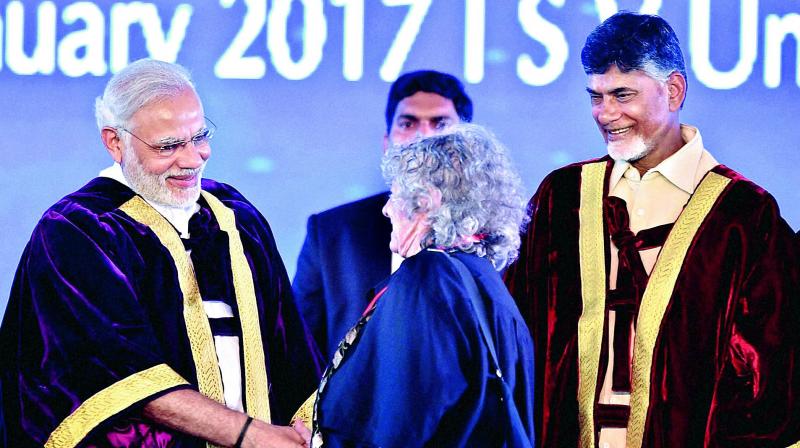Sidelights: 104th Indian Science Congress in Tirupati

Tirupati: The 104th Indian Science Congress was held in the much-revered pilgrim city.
Centre to fund children’s ideas:
A million ideas in innovation, but all from school children! That’s the core of a new ‘catch em young’ initiative of the department of science and technology (DST) set for launch this year as part of a drive to identify novel innovations and nurture them to prototype-stage, and subsequently world-class products. “DST plans to pick ideas of two kids from 500,000 schools across the country, and support them. If ten per cent or a lakh of these innovations succeed, it would augur well for the country,” Dr Ashutosh Sharma, Secretary, DST, told delegates at the ISC here on Tuesday. Listing several initiatives to foster a conducive ecosystem for research and development and encourage innovation, he said DST would step in to support women scientists at all levels.
PM for ‘ease of doing science’:
Prime Minister Narendra Modi got candid and shared his vision on science and technology during a chat with top members of the Indian Science Congress Association, nudging them to pursue cutting edge research and grand, mega-buck projects while guaranteeing complete support to such ventures. Off stage, after inaugurating the ISC, he spoke his mind on the need for India to make a mark in global science by evolving cutting edge technologies. And much to their delight, he agreed on the need for ease of doing science, much on the lines of doing business.
IT’s minister vs Scientists:
While Indian Science Congress Association pleaded with the government to free universities from the clutches of excessive regulations and rued on chronic under funding, the Union minister of science and technology Harsha Vardhan said scientists should come out of selfish thinking of publishing their own papers. The minister further said that the scientists must focus on the impact of their research on the society, so that it brings a positive change in the lives of the common people and helps the government to improve the lives of the people.
DRDO develops anti-freeze bag:
Defence Food Research Laboratory (DFRL), a wing of DRDO, has come up with the anti-freezing bag for soldiers at the high altitude places including Siachen glaciers and Leh in Jammu and Kashmir. “The bag is useful for carrying fresh produces like fruits and vegetables on high altitude terrains in sub-zero conditions. The fruits can be prevented from freezing for 24 hours even at minus 20 degree celsius,” said A.Ramakrishna from DFRL. The test results are very good and this bag is ready to be inducted into the army. The bag is weighing about 3 kg and works on power sources like solar and battery.
Navy warships to get e-drugs:
More than 100 ships and submarines of the Indian Navy will be equipped with telemedicine facilities by 2017. “The Navy has initiated the procurement process and soon all the naval ships will have this facility,” according to the officials from Defence Bioengineering and Electromedical Laboratory (DEBEL). The portable telemedicine system is developed by DEBEL. “It is developed to enhance diagnostic capability and deliver expert medical advice/care through live video. Our telemedicine software can be deployed on low-bandwidth to operate in real time,” the officials said.

